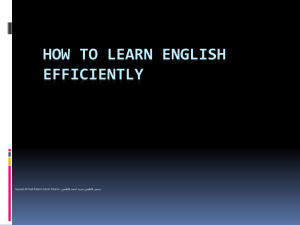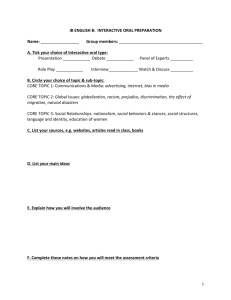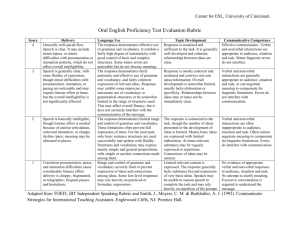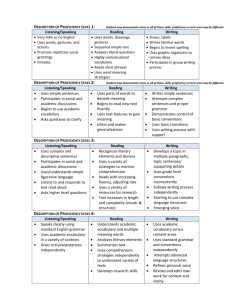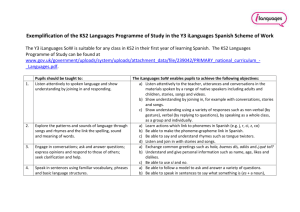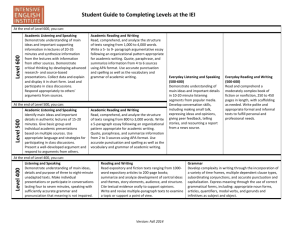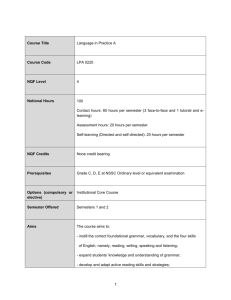How to Learn English Efficiently?
advertisement
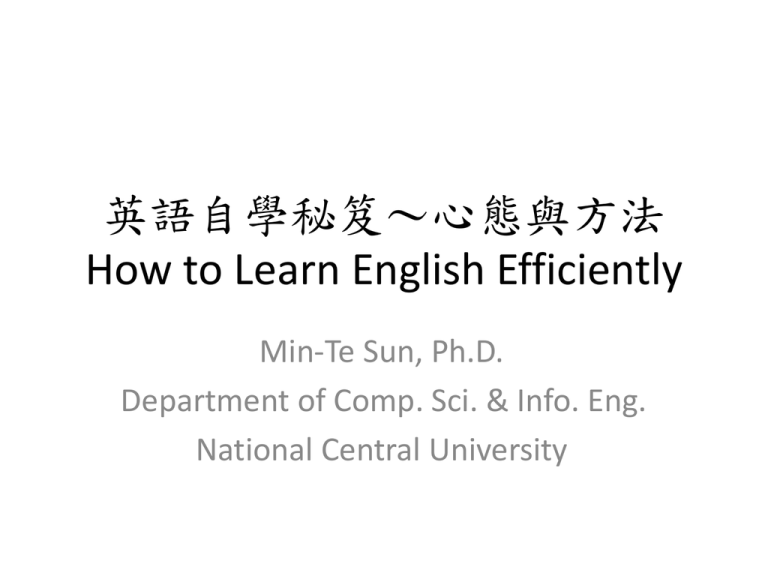
英語自學秘笈~心態與方法 How to Learn English Efficiently Min-Te Sun, Ph.D. Department of Comp. Sci. & Info. Eng. National Central University Disclaimer • I DO NOT MAJOR IN ENGLISH! • I DO NOT WORK FOR ENGLISH DEPARTMENT! • MY UNDERGRADE ENGLISH IS ONLY ABOVE THE AVERAGE! • This presentation content is based on – my personal experience in English learning – especially after studying abroad – the training I received in Singapore RELC this past summer Who Am I? • Min-Te Sun (Peter) Sun – An associate professor of Computer Science & Information Engineering, National Central University – Studied in US for a long time (from 1993 ~ 2002) – Worked as a CS professor at Auburn University, Alabama between 2002 and 2008 (before coming back to Taiwan) – Have taught CS courses in English for more than 10 years Define “Good English” • The ability to communicate with others through English – by reading – by writing – by listening – by speaking • It has nothing to do with English tests! – Getting good grades from English tests is merely a by-product! Is Good English Important? • For Individual – Reading – lifelong learning to improve your competiveness, especially when you want to acquire the most up-to-date knowledge – Writing – emails with foreign friends/coworkers/customers – Listening – Q/A with foreign customers/boss/etc – Speaking – presentation in front of foreign customers/boss/etc, traveling abroad • At University level – Internationalization is one of the most prioritized tasks However, We Have Struggled w/ English • All of us start learning English at least since our junior high school, so why do you still come here? • Issues – Lack good environment? – Bad English teachers? – Too many exams to ruin your appetite? Perseverance is The Key • Courtesy to 研瑞 How to be Persevere in English Learning • Do not set the bar too high – 大家說英語,空中英語教室 – Times, Newsweek Magazines • English learning through Recreation (Fun) – – – – – Playing English games (may not applicable anymore) Attending social events Travelling Listening to music and Karaoke Etc… English Reading • Check your English vocabulary size @ http://www.insightin.com/test/test.phtml – You need about 10000 to score high in TOEFL/GRE/GMAT – The average vocabulary size of a 4-year college native speaker is 20000 – You need about 3000 ~ 5000 words to start with • Basic English vocabulary – http://en.wikipedia.org/wiki/Vocabulary Start with What? • Using English to learn English – Read English textbooks – Play English online games – Browse interesting English websites daily • • • • • • • • http://espn.com/ (Sports News) http://imdb.com/ (Movie Database) http://www.eonline.com/ (E! Entertainment News) http://www.billboard.com/ (Top Music Chart) http://www.dilbert.com (Dilbert Comic) http://www.slagoon.com/ (Sherman’s Lagoon Comic) http://www.peanuts.com/ (Snoopy) http://bensbargains.net/ (Deal Site) English Writing • You should have received enough grammar knowledge from your high school English classes • Never trust Google translation – Better choices out there • http://www.grammarly.com/ • http://www.grammarcheck.net/ • How to improve your writing – Reading, reading, and more reading – Spelling and grammar check tools are your best friends – Imitate Good Sentences • Write English emails (and do it w/ care) daily/often to – International Pen Pals • http://www.interpals.net/ – Your professors/advisors (and ask them to correct your grammar whenever there is a mistake) How About English Listening/Speaking? • The Most Difficult Parts in English Because – No Environment! • Suggestions – Take courses taught in English (there should be plenty at NCU) – Get to know some “language partners” (there are quite a few international students at NCU) – Speak in front of people in English (for presentations, group meetings, TA sessions) <= This will make a huge difference Differences Between English Writing and Speaking • In English writing, we sometimes use sentences with complex structure – I recommend against complex sentences, unless you can not avoid that • In English speaking, NEVER use complex sentences – No native speaker do that, either Other Things You Should Try • Listen to English songs – Do not learn from Rap songs (Ebonics) – Practice singing English songs (KTV is a good place) • Correct yourself whenever you hear something wrong in your own speech – Phase 1 – You are too nervous to even hear your own voice (ask others to correct you) – Phase 2 – Correct yourself (mostly grammar mistakes) – Phase 3 – Improve your pronunciation (tools like audacity help) English Pronunciation American English Accent • Resources – http://www.uiowa.edu/~acadtech/phonetics/engl ish/frameset.html • Tools – Audacity Intonation Makes a Big Difference • Lack of intonation – Mandarin: fixed tones and rhythm – English: variable pitch and tempo • Incorrect intonation – It’s pretty good. – It’s pretty good. • Where can we learn the correct intonation? – English songs – Watch movies (with and w/o caption) • A highly recommended movie: Forrest Gump
